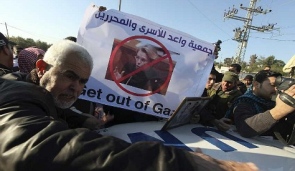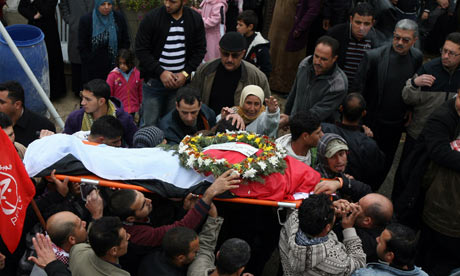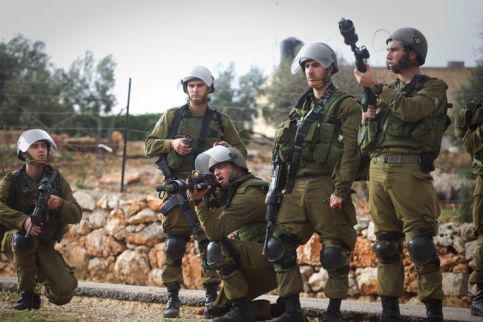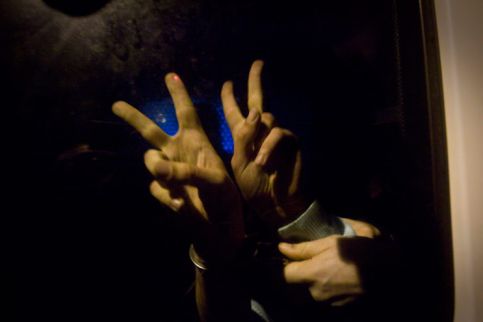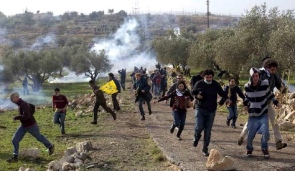EDITOR: The Palestine Papers set the Middle East on new path
The importance of the Palestine Papers, appearing as they do after the popular uprising in Tunisia, and while such an uprising is probably in preparation in Egypt, will surely be judged by history, but one can suggest already that the papers may change the future direction of the conflict, for a number of reasons, and in a number of ways.
That the PA was corrupt, inefficient politically and ‘in the pocket’ of the Israelis, must have clear to all and sundry for a very long time, especially to those living in the Middle East. The fact the ‘leaders’ behind the PA failed miserably in the 2006 Palestine elections, is clear evidence to the level of support they garner in Palestine. The fact they continue to rule unelected, is also evidence to their democratic principles.
However, what is at stake here is much higher. Those ‘leaders’ have, according to the already published papers, been better representatives of Israel than of Palestine. They can see (and accept) the rationale for the Jewish state, and are arguaing for it with gusto. They are less persuaded, anmd less persuasive, on the topic of a Palestinian State.
On the topic of the refugees, they have argued for 0.2% of the refugees to be allowed back. That is really great. Never mind that their love object, Zippy Livni, told them that ‘even one refugee’ is too many. They are quite happy for the US authorities to suggest new locations for the refugees – currently it is South America, next it be the South Pole, and maybe the Moon can also be tried… What do they care about the refugees – as they have signed up for the Likud programme, the refugees can get lost.
They also agree to all of the settlements around Jerusalem, bar one, which is mighty nice of them, seeing that that is exactly what Israel wants and expects of them. They also are discussing an ethnic cleansing, moving hundreds of thousands of Palestinians from Israel to Palestine, in the Triangle area, without ever bothering to ask those Palestinians for their views, just to make Israel more Jewish. Well, they can say – “after all, the US has not asked Chile or Argentina if they wish to take millions of Palestinian refugees, so why should we ask anyone…” So, they are just following the big boys, US and Israel, who, as Livni says to them in one of the documents:”I don’t care about the law, especially international law. I do not accept it.”And who is going to force her to accept it? Not Obama, I don’t think.
Well, all in all, Abass and Kureia are really nice guys, don’t you think? They just don’t wish to create problems for Israel, and why should they? Better that the Palestinians have the problems – after all, they had them for almost seventy years.
Those who think that this will pass and life will be just the same, are very much mistaken, I reckon.
It is also nice to know the MI6, UK’s intelligence arm, is not only illegally infiltrating environmental organisations in Europe with ‘sleeping agent’s which work for years and act an agent provocateurs like the Cheka once did, but also dip their toes into the Palestine puddle, and help to fight the party which won the Palestine elections!
The Palestine Papers Second Installment
Palestine papers: Browse the documents: The Guardian
Use our interactive to explore the most explosive leak ever of confidential documents from inside the Middle East peace process. Click on a location to see related papers
Palestine papers reveal MI6 drew up plan for crackdown on Hamas: The Guardian
• Internment and replacement of imams among measures
• Document proposed ‘direct lines’ to Israeli intelligence
• New files reveal Israel requested assassination of militant
British intelligence helped draw up a secret plan for a wide-ranging crackdown on the Islamist movement Hamas which became a security blueprint for the Palestinian Authority, leaked documents reveal. The plan asked for the internment of leaders and activists, the closure of radio stations and the replacement of imams in mosques.
The disclosure of the British plan, drawn up by the intelligence service in conjunction with Whitehall officials in 2004, and passed by a Jerusalem-based MI6 officer to the senior PA security official at the time, Jibril Rajoub, is contained in the cache of confidential documents obtained by al-Jazeera TV and shared with the Guardian. The documents also highlight the intimate level of military and security cooperation between Palestinian and Israeli forces.
The bulk of the British plan has since been carried out by the West Bank-based PA security apparatus which is increasingly criticised for authoritarian rule and human rights abuses, including detention without trial and torture.
The British documents, which have been independently authenticated by the Guardian, included detailed proposals for a security taskforce based on the UK’s “trusted” Palestinian Authority contacts, outside the control of “traditional security chiefs”, with “direct lines” to Israel intelligence.
It lists suicide bombers and rockets as issues that need urgent attention.
Under the heading “Degrading the capabilities of the rejectionists”, the MI6 Palestinian Security Plan recommends “the detention of key middle-ranking officers” of Hamas and other armed groups, adding: “We could also explore the temporary internment of leading Hamas and PIJ [Palestinian Islamic Jihad] figures, making sure they are well-treated, with EU funding.”
The latest leaks come as US state department spokesman Philip Crowley said they would “at least for a time, make the situation more difficult”, while the senior Palestinian negotiator Nabil Sha’ath acknowledged that the documents were genuine and Palestinian groups in Latin America reacted with shock to the revelation that former US secretary of state Condoleezza Rice had privately suggested Palestinian refugees be settled in Chile or Argentina.
Among the newly released confidential PA documents is an extraordinary account of a 2005 meeting between Israel’s then defence minister, Shaul Mofaz, and the PA’s interior minister, Nasser Youssef.
Referring to Hassan al-Madhoun, a commander in the armed Fatah-linked al-Aqsa Martyrs’ Brigades who was held responsible by Israel for a suicide attack the previous year, Mofaz asked Yousef: “We know his address … Why don’t you kill him?” Yousef replied: “The environment is not easy, our capabilities are limited.” Israel killed Madhoun a few months later in a drone missile attack on his car.
The PLO’s chief spokesman, Saeb Erekat, is recorded as telling senior US official David Hale in 2009: “We have had to kill Palestinians to establish one authority, one gun and the rule of law … We have even killed our own people to maintain order and the rule of law.”
Erekat also complained to US envoy George Mitchell in 2009 that not enough was being done to seal off tunnels from Egypt into the Gaza Strip, the documents reveal, undermining the siege of the Hamas-controlled territory, and urged that more be done by Israel and Egypt to prevent the smuggling of goods and weapons. In an echo of the proposals in the British documents, Erekat told Hale: “We are not a country yet but we are the only ones in the Arab world who control the zakat [religious charitable donations] and the sermons in the mosque.”
The intelligence papers highlight the far-reaching official British involvement in building up the Palestinian Authority’s security apparatus in the West Bank, which was led from the late 1990s by the CIA and recently has focused on the build-up of forces under General Keith Dayton, who was US security coordinator for Israel and the Palestinian territories until last October.
Alistair Crooke, a former MI6 officer who also worked for the EU in Israel and the Palestinian territories, said that the British documents reflected a 2003 decision by Tony Blair to tie UK and EU security policy in the West Bank and Gaza to a US-led “counter-insurgency surge” against Hamas – which backfired when the Islamists won the Palestinian elections in 2006.
The PA’s security control of the West Bank has become harsher and more extensive since the takeover of Gaza by Hamas in the summer of 2007. Hundreds of Hamas and other activists have been routinely detained without trial in recent years, and subjected to widely documented human rights abuses. In a meeting with Palestinian officials in 2009, Dayton is recorded praising the PA’s security: “The intelligence guys are good. The Israelis like them. But they are causing some problems for international donors because they are torturing people.
“I’ve only started working on this very recently. I don’t need to tell you who was working with them before,” – in an apparent reference to the CIA.
Palestine papers: Mosques and radio stations included in secret MI6 plan: The Guardian
Evidence in leaked documents highlights role British officials played in creating and bolstering PA administration
MI6 said the documents reflected a 2003 decision by Tony Blair, pictured above with Mahmoud Abbas, to tie security policy to a US-led ‘counter-surge’ against Hamas. Photograph: Brian Hendler/Getty Images
The Palestinian Authority’s security strategy to crush Hamas and other armed groups on the West Bank was originally drawn up by Britain’s intelligence service, MI6, leaked papers reveal.
The strategy included internment of leaders and activists, closure of radio stations and replacement of imams in mosques – the bulk of which has since been carried out.
Two documents drafted by the Secret Intelligence Service in conjunction with other Whitehall departments, which are among the cache given to al-Jazeera TV and shared with the Guardian, are understood to have been passed to Jibril Rajoub, former head of PA security in the West Bank, at the beginning of 2004 by an MI6 officer then based at the British consulate in Jerusalem.
The evidence uncovered by the leaked documents highlights the role British officials and security advisers have played in creating and bolstering the PA administration in the West Bank, which is backed and financed by the US, the EU and most Arab states as it pursues what are now all but moribund peace talks with Israel.
Hamas, which won the Palestinian elections in 2006 and is backed by Iran and Syria, carried out dozens of suicide bombings in Israel from the mid-1990s and was the target of Israel’s attack on Gaza in late 2008. It opposes negotiations with Israel except on a long-term ceasefire and will not recognise it. Palestinian Islamic Jihad, a smaller group, has similar positions.
The PA is increasingly the target of domestic and international criticism for authoritarian rule and human rights abuses, including detention without trial and torture.
The British papers, one of which is headed Palestinian Security Plan – Confidential, included detailed proposals for a new security taskforce based on the UK’s “trusted PA contacts” outside the control of “traditional security chiefs”, a British/US security “verification team”, and “direct lines” to Israeli intelligence.
Issues include suicide bombing, weapons smuggling, Qassam rockets and “terror finance”. The SIS and other leaked British official documents have been independently authenticated by the Guardian.
In the most controversial section, the 2004 MI6 plan recommends “Degrading the capabilities of the rejectionists – Hamas, PIJ [Palestinian Islamic Jihad] and the [Fatah-linked] Al Aqsa Brigades – through the disruption of their leaderships’ communications and command and control capabilities; the detention of key middle-ranking officers; and the confiscation of their arsenals and financial resources”.
The document adds: “We could also explore the temporary internment of leading Hamas and PIJ figures, making sure they are well-treated, with EU funding” – reflecting a concern to distance the intelligence agency from the PA security organisations’ established reputation for prisoner abuse.
The MI6 strategy, which was drawn up to implement George Bush’s Middle East “road map” as the second Palestinian intifada was winding down, can then be traced through a sequence of more public Palestinian, EU and British documents and plans, and has now been largely implemented by the US and British-advised PA security apparatus.
The leaked intelligence plan can be seen in retrospect as a blueprint for PA security control of the West Bank, which has become harsher and more extensive since the violent takeover of Gaza by Hamas in the summer of 2007. Hundreds of Hamas and other activists have been routinely detained without trial at a time in recent years and subjected to widely documented human rights abuses.
In a meeting with US official David Hale in September 2009, the PLO chief negotiator Saeb Erekat is recorded as saying that PA prime minister Salam Fayyad was “doing everything possible to build the institutions. We are not a country yet but we are the only ones in the Arab world who control the Zakat [charitable religious donations] and the sermons in the mosques” – echoing what had been proposed nearly six years earlier by British intelligence.
The former MI6 officer Alistair Crooke, who worked for the EU in Israel and the Palestinian territories, said today that the documents reflected a 2003 decision by Tony Blair to tie UK and EU security policy in the West Bank and Gaza to a US-led “counter-insurgency surge” against Hamas – which backfired when the Islamists won the 2006 elections.
The CIA played the central role in building up PA security forces from the late 1990s, in close co-operation with the Israeli military and intelligence, detailed in the leaked documents. But particularly after the killing of three US officials in the Gaza strip in 2003, British forces played an increasingly active role – though always in close co-operation with their counterpart US agency, according to diplomatic sources.
The sequence of leaked British documents begins with an unmarked but detailed MI6 draft of the security plan, faxed from the Egyptian embassy, at a time when the agency was working closely with Egyptian intelligence; continues with the second more formal paper jointly drafted by SIS, which floats internment; and is then translated into a series of official papers drafted by the Jerusalem consulate’s military liaison office, which liaises with British special forces, the SAS and SBS.
The documents confirm that by 2005, British projects under the Palestinian security plan – first drafted and passed to the PA under MI6 auspices – included extensive funding of the most controversial parts of the PA security apparatus, including general intelligence, special forces and preventive security under the heading of “UK-Palestinian projects”.
The last in particular has been the subject of repeated and widespread allegations and evidence of torture, including by Amnesty International and Human Rights Watch. More recently, the British government has denied directly funding the PA’s preventive security.
US general Keith Dayton, who, along with a string of British deputies was in charge of building up Palestinian security forces as US security co-ordinator for Israel and the Palestinian territories until last October, is recorded in the leaked Palestinian records as complaining about torture by PA intelligence in a meeting with chief PLO negotiator Saeb Erekat in June 2009. “The intelligence guys are good. The Israelis like them,” Dayton says. “But they are causing some problems for international donors because they are torturing people”, adding: “I’ve only started working on this very recently. I don’t need to tell you who was working with them before” – in an apparent reference to the CIA.
In an interview with al-Jazeera, former Dayton deputy US colonel Phillip Dermer described the PA as constituting a “police state” and its security forces as an outsourced “third Israeli security arm”.
Many of those now arrested and detained in the West Bank appear to have no connection to any armed group or activity. Records of a May 2008 meeting between Israeli general Amos Gilad and the head of PA security forces, Major General Hazem Atallah, refer to a senior Israel security official identified as “Poly” who asked: “How is your fight against ‘civilian’ Hamas: the offices, people in municipalities etc? This is a serious threat.”
Atallah is recorded as replying: “I don’t work at political level, but I agree we need to deal with this” – to which Poly retorts: “Hamas needs to be declared illegal by your president. So far it is only the militants that are illegal.”
Another leaked PA security document from 2005, drawn up by a Palestinian official, confirms the central role played by British officials in “unifying Palestinian security efforts” and identifies a former PA senior security figure, Bashir Nafi, as having “strong ties with the British”.
Along with Abed Alloun, Nafi was a deputy to Rajoub. Alloun and Nafi were killed in a bomb attack in Amman in 2005. Alloun, a Liverpool football fan, told the Guardian in 2003 he had been flown by MI6 to Britain and taken to see Liverpool play at Anfield and given a ball signed by Michael Owen.
